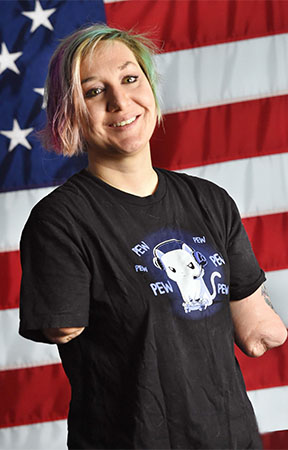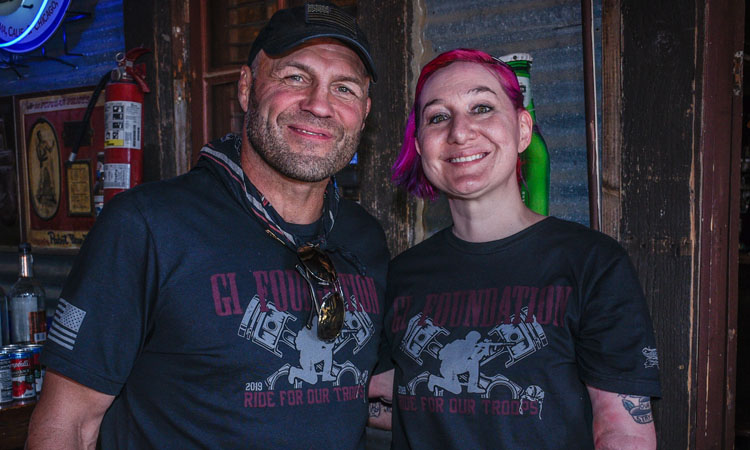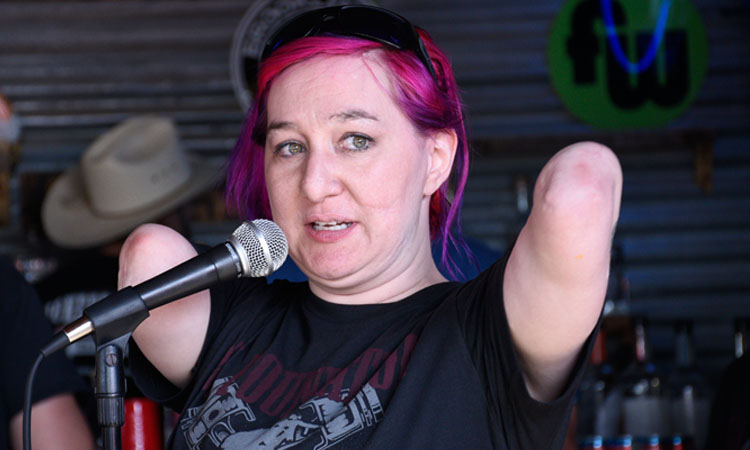The Xtreme Couture GI Foundation has had the honor of having Mary Dague tell her story at two seperate XCGIF fundraising events.
Mary's story is full of adversity yet her postitive outlook on life and her outgoing personality will touch your heart.
From her childhood trama to Double-Arm amputee to Breast cancer survivor Mary has had to battle more in her young life than anyone could fathem.
Take a few moments to read a story that will inspire you.

'I was the one screaming'
By Heather Osbourne
nwfdailynews.com
https://www.nwfdailynews.com/news/20170704/i-was-one-screaming?template=ampart
NICEVILLE — Purple Heart recipient Mary Dague said a person's life can drastically change in the time it takes for a bomb to detonate.
The 32-year-old with rainbow hair and a spunky personality spoke from experience as she recently sat in her Niceville home — and played video games with her toes.
Dague, a former Navy Explosive Ordinance technician, is a double-arm amputee. For the past 10 years, she has dedicated her life to helping combat wounded veterans' suicidal thoughts and depression by using a combined method of dark humor and her own personal testament.
"I've had veterans come up to me and say, 'Because of you, I didn't go home and eat a bullet,' " Dague said. "It doesn't matter who you are, that resonates with you."
On Nov. 3, 2007, Dague, a part of the U.S. Army's 707th Ordnance Company in Baghdad, Iraq, received a call from the Iraqi Army informing her unit their soldiers had just recovered an improvised explosive device.
The unit's team leader instructed the foreign army to take the bomb to a nearby demolition range to safely detonate it, Dague said.
"Instead of bringing it there, they went out of their way and placed it between a children's school and a housing project," she said.
Despite the unit's unanimous "bad feeling," the team decided to risk their own safety to recover the active bomb.
"We could have legally blown it up where it was, but we weren't going to do that," Dague said. "There were kids and civilians freaking everywhere."
It was in that bomb's recovery that Dague "bear hugged" the explosive to save her teammates after the bomb became unstable in the unit's vehicle.
Dague, along with her partner, were thrown from the vehicle after it detonated. She said as she was flying through the air from the explosion, all she could hear was a woman's screams.
"I legitimately thought, 'Someone shut that bitch up,'" Dague said. "I took a breath and the screaming stopped. I realized in that moment that I was the one screaming."
Dague's unit quickly came to her rescue as they placed tourniquets on her arms and had her airlifted off the battlefield.
The soldier later awoke in a German hospital to her now ex-husband sitting at her bedside.
"I woke up and everything was white so I knew I was in a hospital," Dague said. "I looked over at my left arm and thought, 'Well, that one is gone.' Then I looked over to my right arm and I'm like, 'Oh God, that one is even shorter!' Honestly though, I was just thankful to be alive."
Dague also lost about 70 percent of her hearing, received facial damage and suffered a crushed eye socket.
She said her first question to her ex-husband was the same she asked her teammates after losing both arms in Baghdad.
"I asked if everyone else was OK," Dague said. "He told me yes. Just knowing everyone was fine made the whole thing completely worth it. Don't get me wrong, I had a few bad days. Everyone has that 'Why me?' moment where they cry, scream and hate the whole world for being normal."
To help cope with her new disability, Dague said she began to seek out other wounded veterans for guidance.
"I was suffering alone and I saw other guys suffering alone," Dague said. "My experience taught me that we should go through this thing together. When you're going though it with somebody it makes it easier."
With newfound hope and positive outlook, Dague said she "found herself again" and began to be a crutch for other veterans going through traumatic experiences. She eventually went on to become a motivational speaker. She now travels across the U.S. teaching soldiers about resilience.
"We're taught in the military to bottle things up," Dague said. I tell them they need to let things go. If you bottle things up it just creates a bigger explosion."
After her injuries, one of the first soldiers Dague helped through a depression was her current husband, James Cribbett.
Dague and Cribbett, a soldier in the U.S. Army, united after losing a mutual friend in Iraq.
"Mary contacted me on Facebook and told me that the guys told her I was going through a hard time," Cribbett said. "She told me that I could come and crash on the couch and drink beer and watch Netflix. That's what we did."
"You don't let brothers go through that alone," Dague added. "Being there for people is something I've always done. I've always just been a big bleeding heart."
In 2013, Cribbett returned the favor and was by Dague's side when she received her yet another health scare — breast cancer.
"They couldn't confirm this, but the breast cancer could have possibly been linked to the explosion," Dague said. "I did six months of chemo, which sucked. I had to have a double mastectomy."
Cribbett proposed to Dague while still receiving chemotherapy treatments.
Dague said she also uses her cancer experience to relate to other veterans who need help.
"I tell them I've gone through a divorce, I've lost my arms, I've had breast cancer," she said. "I tell them that I can relate, so just tell me what's going on."
After recovering from cancer, Dague received an opportunity to star in two veteran-funded, written, produced and acted movies – "Range 15" and "Not a War Story."
"'Range 15' is very crude," Dague said. "It's got our dark sense of humor and how we deal with stuff, especially when you're in the thick of it.
"You're not telling dad jokes when you're getting shot at," she continued. "You're telling very dark jokes. That's just how we all are. If you see us at all then you should probably see us at our most extreme."
In addition to acting and motivational speaking, Dague is also a video game live streamer. She and her husband both run a video game channel "drinkandbrosgaming" on Twitch.tv.
The two movies, Dague said, help debunk the stereotype Hollywood created with its most recent war films. A stereotype, she said, she hopes to continue to remove from the minds of Americans.
"The two things that Americans know about soldiers are that they go to war and they come back with PTSD (post traumatic stress disorder)," she said.
The truth, Dague said, is that although a large number of veterans do suffer with PTSD, civilians should look upon them with pride rather than pity.
"Instead of doing an ice bucket challenge or 22 push ups, tell the government to teach soldiers how to handle it. How to not bottle things up. Teach them to talk to somebody. That's what we really need."


